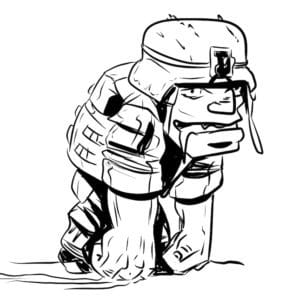The term “knuckle dragger” is often used casually, but its underlying meaning carries a heavy weight of prejudice and disrespect. This seemingly innocuous phrase carries with it a long history of dehumanization, reducing individuals to a caricature of supposed primitiveness. Understanding the origins and implications of this term is crucial for fostering respectful and inclusive communication.
This article will delve into the meaning of “knuckle dragger,” explore its offensive and derogatory nature, and examine the harmful stereotypes it perpetuates. We will also discuss the impact this term has on individuals and provide guidance on how to avoid its use in favor of more respectful language.
Meaning of “Knuckle Dragger”
At its core, “knuckle dragger” refers to a person perceived as unintelligent, uncivilized, or lacking in sophistication. The imagery conjured by the term is one of a primitive being, moving through the world with a lack of grace or refinement. This image is often associated with outdated notions of human evolution, portraying certain groups as being stuck in a more “primitive” stage of development.
The term is typically used to belittle or mock individuals who are perceived as different or outside of societal norms. This can include people from marginalized communities, those with disabilities, or anyone who challenges conventional ideas or behaviors.
Historical Context
While the exact origins of the term are unclear, it likely emerged from anthropological theories of human evolution that were popular in the early 20th century. These theories often portrayed non-Western cultures as being less evolved than Western societies, reinforcing existing prejudices and justifying colonialism.
The term “knuckle dragger” became a shorthand for these outdated and harmful ideas, associating certain groups with a perceived lack of intelligence and progress.
Offensive and Derogatory Nature

The use of “knuckle dragger” is inherently offensive and derogatory because it reduces individuals to a simplistic and dehumanizing stereotype. It implies that certain people are inherently inferior or less worthy of respect based on their perceived lack of intelligence or sophistication.
This type of language is harmful because it perpetuates negative stereotypes and contributes to a culture of prejudice and discrimination. It can have a profound impact on the self-esteem and mental health of individuals who are targeted by this term.
Impact on Communication
Using “knuckle dragger” in conversation is disrespectful and undermines the value of open and honest dialogue. It creates a hostile environment where individuals may feel afraid to express their thoughts and ideas for fear of being ridiculed or belittled.
Instead of fostering understanding and empathy, this term reinforces divisions and creates barriers between people.
Harmful Stereotypes
The term “knuckle dragger” relies on a number of harmful stereotypes about intelligence, culture, and social behavior. These stereotypes are often based on outdated and inaccurate assumptions about human evolution and societal progress.
Some of the harmful stereotypes perpetuated by this term include:
- Association with low intelligence: The term implies that individuals labeled as “knuckle draggers” are inherently less intelligent than others.
- Lack of sophistication: It suggests that these individuals are uncultured, unrefined, and lacking in social graces.
- Primitive behavior: The term evokes images of people living in a state of savagery or barbarism, disconnected from modern society.
These stereotypes are not only inaccurate but also deeply damaging, as they contribute to the marginalization and dehumanization of individuals who do not conform to dominant societal norms.
Impact on Individuals

Being called a “knuckle dragger” can have a profound impact on an individual’s self-esteem and mental health. It can lead to feelings of shame, humiliation, and isolation.
For individuals who are already facing discrimination or prejudice, this term can reinforce their sense of otherness and make them feel even more vulnerable. It can also have a negative impact on their academic and professional opportunities, as they may be perceived as less capable or competent.
Long-Term Effects
The use of derogatory language like “knuckle dragger” can have long-term consequences for individuals and society as a whole. It contributes to a culture of intolerance and disrespect, making it more difficult to create a truly inclusive and equitable society.
By challenging the use of this term and promoting respectful language, we can work towards creating a more just and compassionate world for all.
Avoiding the Term
It is important to be mindful of the language we use and to avoid perpetuating harmful stereotypes. Instead of using “knuckle dragger,” consider using more respectful and accurate language to describe individuals.
For example, if you are trying to express that someone is unintelligent or lacking in sophistication, you could say:
- “They seem to have a limited understanding of the topic.”
- “Their behavior is not very refined.”
Remember, words have power, and it is our responsibility to use them in a way that promotes understanding and respect.
Conclusion
The term “knuckle dragger” is deeply offensive and harmful. It perpetuates negative stereotypes, dehumanizes individuals, and contributes to a culture of prejudice and discrimination. By understanding the origins and implications of this term, we can work to avoid its use and promote more respectful and inclusive language.



